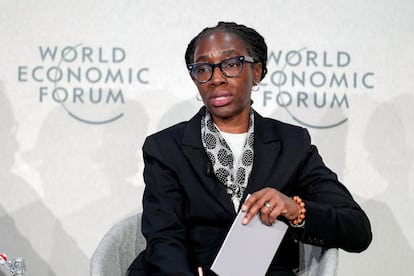Comfort Ero, conflict expert: ‘We are witnessing the return of spheres of influence. Trump is not the cause, but the symptom’
The president of the International Crisis Group believes that in the new political context, Europe needs to ‘turbocharge’ its defense umbrella


Comfort Ero is the president and CEO of the International Crisis Group, a leading organization dedicated to preventing and resolving conflicts. She gave this interview on Friday in the café at the Davos conference center, a venue that, during the World Economic Forum’s annual meeting, hosts an impressive parade of high-level figures from the political, economic, and academic sectors. Ero notes that the world is witnessing “a return of spheres of influence” and warns Europe that it must “turbocharge its defense umbrella.”
Question. The world is currently facing a shocking wave of conflicts, such as those in Ukraine, the Middle East, Sudan, and, until recently, Ethiopia. Do you see any common denominator in these episodes of violence?
Answer. There is a connection. There is a trend of weakening of the systems that used to act as guardrails to constrain, sanction, cajole and urge fighters to take a different direction. Whether it is the United Nations or bodies like the African Union. As the West’s influence wanes, others are rising, and they do not necessarily share the same values. And there is a readiness by all these other countries to assert their own national interests, which often collide with one another. That is one of the undercurrents and, frankly, the other big undercurrent that connects a number of conflicts now is the return or assertiveness of great power politics. That is being propelled strongly by Trump as well. He is not a cause, but a symptom of this. He is a child of this turbulence. But he is surely going to accelerate it further.
Q. Are we witnessing a reconfiguration of the global order?
A. People say that we are between two orders, that it is uncertain where we are going. What is very clear is that there is certainly a paradigm shift as well. And it’s not going to be the classic rules-based order that has guided and shaped international politics since the end of the Cold War.
Q. How do you interpret Trump’s statements on his plans for the United States to control Greenland and the Panama Canal?
A. It fits with the logic of “America First.” He keeps saying, “We didn’t give up the Panama Canal for China could come in.” So it’s about China as well. That’s one way of seeing it. Greenland is a national security interest. Again, it’s about China. It’s about readjusting the jigsaw, because he can see China expanding its tentacles in different ways. That’s an important lens to understand this. And for me, Trump is trying to reassert American interest, the sphere of influence in the Americas. If you ask me, as you did, about what kind of order we’re going toward, we see a return of spheres of influence: we control this, you can control that.
Q. How far are we from an end to hostilities in Ukraine?
A. There is a recognition, silently spoken or observed, that Ukraine is outgunned and outnumbered. That doesn’t mean it’s on the verge of collapse. I mean, it can still go on, it can still carry on fighting. But at a severe cost. And it needs some kind of reprieve. Whereas, on the other side, Putin sees Russia as still having the upper hand. It’s slightly more resilient, even if the economy is struggling. But what Putin doesn’t want is to have to resort to a mobilization campaign. So I think he’s interested in the idea of exploring what a negotiation would look like. He’s interested in seeing what the Americans are going to put on the table. The big issue is security guarantees. If it is not NATO membership, what does the alternative look like? The deterrent mechanism is essential. It’s still up in the air. And I think, frankly, Europe has to turbocharge its own defense umbrella, because the Americans have been quite clear with the idea that ‘this is your backyard. You have to step up, get ready. We have bigger issues to deal with in Asia.’ And there is a sense in which Europe is somehow not understanding this.
Q. How fragile is the stabilization in the Middle East?
A. It is fragile, but the risk of collapse should not be overestimated. The Trump factor has been instrumental in achieving this. So now he is involved and that projects a certain stability. But a big question mark remains, because obviously you are dealing with two sides with a high degree of skepticism and mistrust. A key issue is to look not only at Gaza, but at the West Bank, which for me is the silent war. Greenlighting the continued annexation and this very pernicious settler takeover. And that calls into question any notion of fulfilling Palestinian aspirations and the road towards Palestinian statehood. That, for me, is the key piece of the jigsaw. You think that all that matters is the ceasefire in Gaza. Meanwhile, the green light is given to the continuation of this annexation.
Q. Regarding silent wars, a conflict is developing in Sudan that is causing immense human suffering and yet attracts little political or media attention.
A. It’s a humanitarian disaster that, if we didn’t have these other major conflicts, would have been really high on the agenda in security camps. If you’re looking for a very good example of the dysfunction of the crisis management system, Sudan is the poster child for this new conflict landscape that we’re in.
Sign up for our weekly newsletter to get more English-language news coverage from EL PAÍS USA Edition
Tu suscripción se está usando en otro dispositivo
¿Quieres añadir otro usuario a tu suscripción?
Si continúas leyendo en este dispositivo, no se podrá leer en el otro.
FlechaTu suscripción se está usando en otro dispositivo y solo puedes acceder a EL PAÍS desde un dispositivo a la vez.
Si quieres compartir tu cuenta, cambia tu suscripción a la modalidad Premium, así podrás añadir otro usuario. Cada uno accederá con su propia cuenta de email, lo que os permitirá personalizar vuestra experiencia en EL PAÍS.
¿Tienes una suscripción de empresa? Accede aquí para contratar más cuentas.
En el caso de no saber quién está usando tu cuenta, te recomendamos cambiar tu contraseña aquí.
Si decides continuar compartiendo tu cuenta, este mensaje se mostrará en tu dispositivo y en el de la otra persona que está usando tu cuenta de forma indefinida, afectando a tu experiencia de lectura. Puedes consultar aquí los términos y condiciones de la suscripción digital.








































